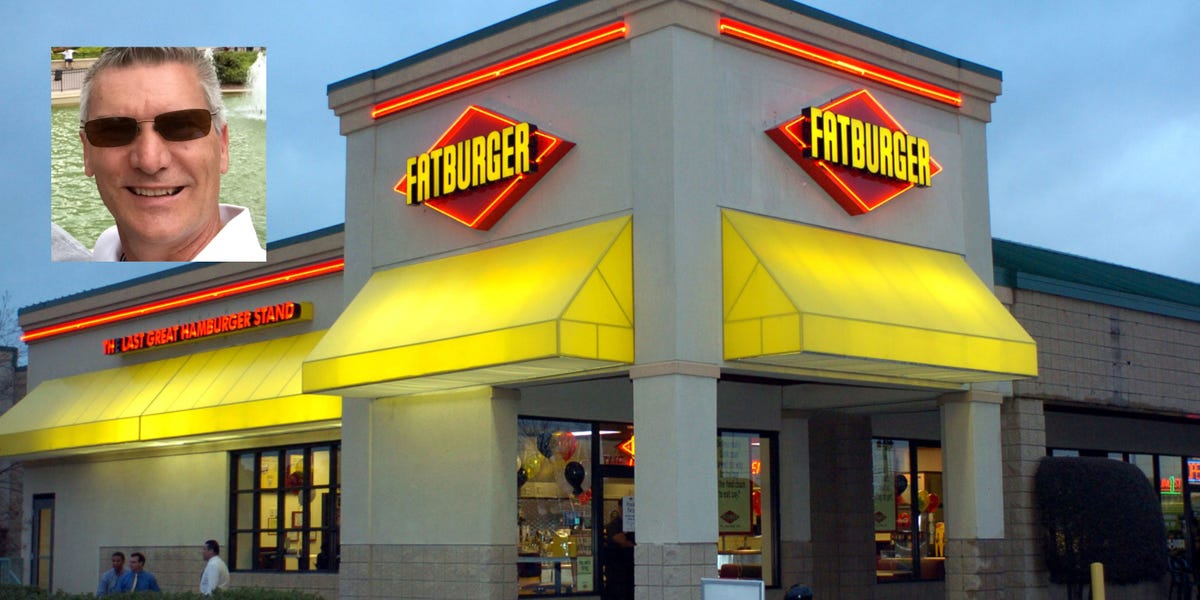I REALLY want to see the last few years of profit margins that these asshats are earning that are so vital to maintain that they are “forced” to pass the financial hit on to their workers (who are doing ALL the actual work). “If the minimum wage goes up, they either have to increase prices so that they can cover the increased expenses for labor, or they’re going to have to consolidate their labor and let people go,” Lederman told BI. Thanks Lederman, you tone deaf douchnozzle. Why can’t they earn slightly less profits so everyone can, I dunno, live their fucking lives?
removed by mod
I would buy a Sonic franchise in a heartbeat. Unfortunately Sonic requires anyone buying in to have a net worth of at least 1 million dollars. Sadly I am just shy of meeting the mark. And yes, I would be the change if I could. I only need enough money. I don’t need ‘fuck you’ money.
removed by mod
Why don’t you run a restaurant, yourself
This is all making sense now, you’ve been emotionally triggered by this post and the opinions here because you’ve likely had personal experience with owning and/or operating an eatery.
How long did you last? A year?
Friendly reminder that the “restaurants have razor thin margins!” is a lie. Their margins might seem slim, but doing huge amounts of sales means big money.
You’ve got to be wildly popular for that to work though. I’ve run about two dozen restaurants. The ones that are always packed make good margins. Many are razor thin.
This line always bothers me. When I worked broiler I realized that a NY strip steak retailed at 23 bucks. I made 14/hr and would make dozens of steaks an hour on average with most happening Friday night. The NY strip at cost was just under 7 bucks. It took me less then one hour on that busy shift to pay my entire weekly salary with the revenue I generated in steaks alone, but almost 2 hours of work to afford one for myself. Steamed vegetables, soda, pasta, anything with minimal prep had even better margins.
That particular store went under but not before the owner literally bought three yachts. THREE. That experience alone would radicalize any reasonable person
The risk in running a restaurant is exactly this. Sometimes good businesses just can’t support themselves. Their employees need to earn enough to live and the owners need to earn enough to keep the business afloat. You can’t have the latter without the former so if your costs are too high, you have to close. No one deserves to run a business and the food world is full of the absolute best ideas and people that totally bomb.
“Eliminating employee vacation”
His workers had an average 48 hours of yearly vacation time. That is not vacation time.
What trash
At $20 that’s less than a thousand dollars a year.
I’m shocked they had any vacation time at all! I’ve never heard of anyone in the food industry (besides managers) that get any PTO. I’m also surprised how much PTO they get! Teachers only get 40 hours a year.
Notice how he wouldn’t be tightening his belt so that workers can have a better wage.
You can look at his picture and the background to get a sense of the REAL problem.
He should try pulling harder on his bootstraps.
And cut out the avocado toast.
That’s what he’s doing though isn’t he?
deleted by creator
Where does the owners say that the owner is making sacrifices? I read the article, but the title actually tells most of it, for once: I’m a California restaurant operator preparing for the $20-an-hour fast-food wage by trimming hours, eliminating employee vacation, and raising menu prices.
Nothing in there about the owner trying harder or making sacrifices, just passing the cost to his workers (eliminating PTO) or customers (increasing menu prices). Who knows, maybe he is…but the article does not say it.
He’s pulling himself up by the bootstraps, how he’s doing it is irelevant.
Those aren’t bootstraps, they’re the backs of those less fortunate.
I like how you said “the bootstraps” because it sure ain’t his bootstraps that he’s pulling lol
How much you think there is to tighten? Restaurants run on thin margins. Let’s play with numbers.
Say this guy profits $1,000,000/yr., ALL profit. And he gives up every penny of that to make payroll. Let’s say his labor and risk are worth nothing. I’m OK with that. Hell, you’re lucky to take a loss, for years, starting a business, let alone break even.
At $20/hr., that’s 50,000 manhours he can employ. But not really. An employee pocketing $20 probably costs his employer $40. OK, 25,000 manhours. That’s about 480 hours of work per week he’s able to use. So 12 employees? Spread over 4 restaurants?
And notice the part where he said $20 was rock-bottom? And higher-level employees will need more to keep them on?
So instead of saying fuck it and pulling the plug and selling his assets, he’s trying to tighten up, keep those people on the payroll. And gets demonized for it.
Thank you for coming to my TED Talk. In our next Talk we’ll be bitching about sky-high fast-food prices.
tl;dr: Y’all seeing billionaires and megacorps raiding the economy and conflating them with guys like this.
IIT: Buncha people who have never worked payroll and have no clue how it works.
Your numbers are wildly off. The raise amounts to 4$, your going from 20$ and jumping to 40$ is irrelevant because the employees are already employees, the only cost increase here is the 4$ extra per hour.
So you’re looking at closer to 200k manhours based off your calculations or around 100 employees.
He runs 4 restaurants, and with that million dollars in profit he could cover the raises of 100 employees, and I highly highly doubt he’s running anywhere near 25 employees per restaurant.
Restaurants run on thin margins.
Not anywhere near as thin as you think. The official numbers are AFTER artificially deflating their profits for tax avoidance reasons.
he gives up every penny of that to make payroll.
Ridiculously unrealistic.
An employee pocketing $20 probably costs his employer $40
What have you been smoking?? In the real world, workers produce a hell of a lot more value than they’re given in return. That’s how companies profit.
he’s trying to tighten up, keep those people on the payroll.
No, he’s trying to recoup the profits lost from paying his workers a living wage by making it less livable for them. He’s protecting his profits, not workers.
And gets demonized for it.
And rightly so. He’s acting like the put upon victim when in reality he’s complaining about having to pull other exploitation levers now that one is fixed at a lower setting.
You have just calculated that he can hire 12 more people from the current profits (with made up numbers). That’s not what’s in question here. He’s already got the people and needs to pay them marginally more.
If he had left it at “I’m raising prices”, then no one would have an issue with what he said.
The rest of it is just him being a giant asshole
Everyone except dumbasses with no critical thinking skills understands that in order to pay people a living wage, prices have to adjust accordingly
Everyone except dumbasses with no critical thinking skills understands that in order to pay people a living wage, prices have to adjust accordingly
Except not really. Businesses have much wider profit margins than they pretend to.
For example, in Denmark the McDonald’s entry-level wage is the equivalent of $22 and a Big Mac costs LESS than in most of the US. If McDonald’s couldn’t afford that, they’d simply stop doing business in Denmark. They don’t.
The is a poor excuse and will cause lost of business because this guy wants all the money, not just some.
The paid vacation he’s eliminating was capped at 72hrs per year. He warns that high schoolers will have a tough time competing with more valuable employees, but this is due to the wage increase only applying to fast food. Also, the big layoffs in in-house delivery are similarly due to the narrow scope of the law which excludes gig workers.
“Landlords won’t lower their rents”-- these things take time.
“Landlords won’t lower their rents”-- these things take time.
For sure. A market correction on landlords require businesses leaving the property and then the landlords defaulting their loans to the bank. But no matter what that still needs to happen, because an economy where we value parasitic capital over paying labor a living wage is fundementally broken.
I agree, but it takes a strong stomach in local government to not step in and prop up “market rates” for the benefit of banks and landowners.
A market correction on landlords require businesses leaving the property and then the landlords defaulting their loans to the bank.
Or, it requires landlords who can see that coming and adjust preemptively.
If everyone wasn’t leveraged out of their ass, that would be fine. Unfortunately, that’s a feature of our late stage capitalism. I don’t hold much sympathy for them. though. In the end, the lenders are just another parasite on top of a parasite.
The new California law doesn’t apply to employees at full-service chains such as Chili’s or Cheesecake Factory.
That’s really strange. A minimum wage for just fast food?
More demanding/easier to abuse probably.
Full-service chains have their own minimums because of our shitty tipping culture.
But the kitchen staff isn’t getting tipped at those restaurants.
Funny thing I’ve noticed over the years, the people actually working for tips are never the ones bitching. What do you make of that?
Based on my experience in jobs with tipping, the people who don’t get tips quit and do something else and the ones that get good tips like to complain that all servers would get less if there was a reasonable minimum wage because they assume everyone else gets the same.
Note that there is constant turnover in tipping positions because most people don’t make good tips.
Yeah that person should go out into the countryside and see if those employees “don’t complain about tipping”. I know I sure did.
That’s because they have a joke of a governor. They didn’t raise the minimum wage, just for fast food.
yeah fuck baby steps. and fuck the governor because other governors are doing better, right?
right?
The beatings will continue until morale improves!
If you’re in L.A. Make sure to boycott Fatburger.
removed by mod
Oh no!
Probably shouldn’t have gotten rid of slavery as now the slaves don’t have a job anymore either.
Won’t somebody think of upholding the problem?!
Oh boo fucking hoo. I think OP just posted this to piss people off. Worked, at least a little, on me.
If I cry harder I will be the real victim mentality.
TLDR: “Hey, everybody. I’m a stupid moron with an ugly face and a big butt and my butt smells, and I like to kiss my own butt.”
Thank you, Bart.
It’s good that Bart did that. It’s very good.
If you can’t do business in CA, then don’t. OR treat your employees like shit. Sure.
Not one fucking word in this article about what the ratfuck owner clears every year from his four franchises. Nobody bothers to ask the question, because wage increases are a sin borne only by the consumer, so sayeth supply-side Jesus.
A building full of well paid employees serving high quality food can pay for the building, the livelihood of all its employees and all of the quality food used to make its offerings. But it can’t pay for all that PLUS the guy sitting on top of it all skimming off $100K every year while literally doing nothing. HUH. Well, fuck 'em.
removed by mod
I think a non-profit fast-food place is an awesome idea, myself.
They really offered 2 possible outcomes:
- Increase prices
- Fire people
Why not just . . . make less money?
The increase was $4. The article kept using percentages to make it seem like some big scary change, but the increase is 1 meal per hour per worker. I’m pretty sure any half decent restaurant can handle that extra $4 per worker hourly.
But no, the solution is clearly to just nuke your vacation policy so you can save $1000 per worker per year. Yeah okay.
1 meal per hour per worker
Fat Burger in LA is charging $17.29 for their most basic meal. That comes out to one extra meal per hour, per every 4 employees.
That franchise owner is really just a cheapskate asshole.
American notions of profit and loss are fucked up.
It doesn’t matter if you’re profitable. Let me say that again. It does not matter if you’re profitable.
You have to be making MORE profit than you did same time last year, last quarter, last month.
If you don’t keep making more profit, you are somehow “losing money”. Money that’s “rightfully owed” to you. Money that should and would have otherwise been yours.
And if you’re a publicly held company and you miss that profit goal, the stock market will PUNISH you.
Hell, you could make more profit and STILL get punished if you didn’t “beat expectations”.
You bring up a great point. Once I applied for a mortgage and showed that I had a part time job and a small business. I had made some changes in my financial structure so it looked like on paper that year my company was failing even tho personally I made more money consistently over the years. Didn’t matter, my loan got rejected cuz technically the business was making less money.
That’s because investors only make money when the value goes up. The pressure to always make more money than before is baked into the public ownership system we created. I think we should make all companies employee owned instead of investor owned and then you’d fix the broken incentive structure.
removed by mod
It’s reflected in stories like this:
I think this is neat. I prompted chatGPT-4 with your question about the above comment. This was the result:
Your perspective on the issues with the current focus on continual profit growth in American businesses is indeed echoed in various discussions and criticisms in the business and academic world.
A significant point of critique is the heavy emphasis on shareholder value, often at the expense of other stakeholders. This shareholder-centric view has been dominant for some time, with the primary objective seen as maximizing profits for shareholders. However, this perspective often disregards the broader responsibilities and long-term vision of companies. Recently, there has been a shift towards “stakeholder capitalism,” where companies are increasingly recognizing the importance of considering the interests of all stakeholders, including society at large, and not just focusing on short-term financial performance. This approach aims to foster a more sustainable balance between short-term pressures and long-term value creation, and helps restore trust in companies as vital contributors to society [❞].
The pursuit of continual growth and the pressure to exceed previous profit margins has also been critiqued for leading to other detrimental effects. For instance, unchecked business growth can result in increased workload, higher competition, a deviation from the original business vision, lower-quality customer relationships, and faster team member turnover. These factors can contribute to a loss of the unique qualities that made a business successful in the first place and may ultimately lead to less success in the long term [❞].
Furthermore, in the realm of stock prices and corporate valuation, the relationship between growth expectations and stock performance is more complex than often portrayed. Research suggests that growth expectations might have less impact on asset prices than traditional models suggest. This indicates that the market’s demand doesn’t react strongly to changes in expected returns, challenging the common belief that consistently higher profits directly lead to higher stock prices [❞].
These critiques highlight the complexities and potential pitfalls of the current American business model, which prioritizes constant profit growth and shareholder value, often at the expense of broader, long-term goals and responsibilities.
You know how I know it hallucinated part of that answer? It said companies are now considering their affect on society. Lol yeah, ok.
They claim to do that every few years, just to get a percentage of angry folks to quiet back down a bit.
Simon sinek is a leadership coach and has some people centric views on corporations, profit and leadership. He’s a hard critic of Jack Welch as a symbol of late stage capitalism.
Started on Adam Smith “the customer is the goal” and got it got to trickle down economics and shareholder supremacy at the cost of employees, customers and environment.
In this video you can see his shortest summary on historic views on capitalism.
Every video I see from him he’s brutal when mentioning Jack Welch, the thought leader of GE in the 80s, that turned things from a generation of loyalty to a company over 50y to massive layoffs season at Xmas because shareholders are unhappy.
Don’t you think that if someone else could come in and undercut this restaurant by just taking home less money they would have already?
Could? Yeah. Will? Unlikely. If other restaurants are getting away with a certain level of exploitation then there’s not a significant monetary incentive for a newcomer to exploit less.
That’s part of the issue.
The only incentive that apparently matters to most people is monetary.
removed by mod
There’s a difference between economic theory and economic reality. People aren’t exactly rational when it comes to emotional things like “I’m earning less right now.” Even if the end result could be more income later, they refuse to accept that and say “well they’re charging x and paying y so I can get away with that too! Leaving money on the table is stupid!”
I think a not insignificant portion of business owners/CEOs all fail the marshmallow test.
Why do so many fast food places only pay minimum wage and throw a hissy fit whenever someone proposes raising it? Why don’t they simply pay their workers more?
Cause the workers are expendable and their exploitation has been normalized to the point that there is no monetary incentive to pay more. Yes, there are restaurants that do pay more, but it’s often driven from some other ideology, not just trying to make the most money, and most consumers honestly don’t care. The same consumer will sometimes visit McDonald’s, Chik fil a, or In n Out regardless of workers pay, hell I even know a few gay people that turn a blind eye to owner politics when visiting restaurants. 'Cause at the end of the day people are turning up for convenience or to satiate a particular craving, not because one company pays more.
Oh no! What will those poor employees do now that they can work at literally any fast food chain for $20/hr!














